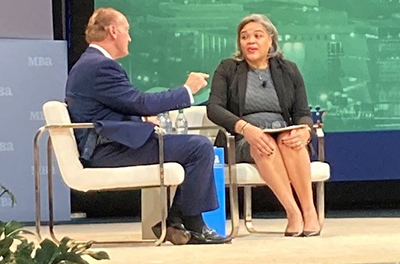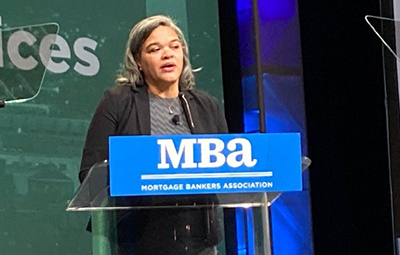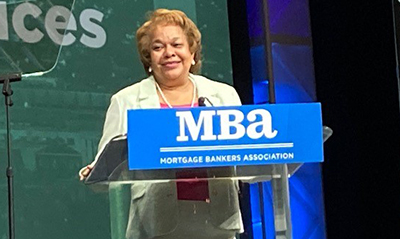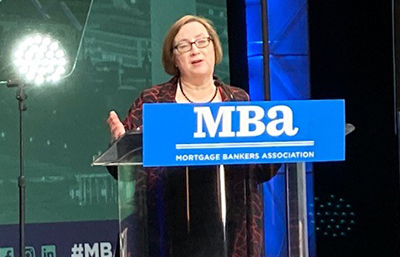
#MBAAnnual22: Ginnie Mae, FHFA, FHA Go Big

(Ginnie Mae President Alanna McCargo (r) speaks with MBA Chairman-Elect Mark Jones at #MBAAnnual22 Monday.)
NASHVILLE—Presentations by government agencies at major events such as the Mortgage Bankers Association’s Annual Convention & Expo can be pretty staid affairs. Not so this year. On Monday, Ginnie Mae, the Federal Housing Finance Agency and FHA made one major announcement after the other, literally creating their own news cycle. To wit:
–Ginnie Mae announced it is shortening the re-pooling seasoning requirement for re-performing loans from six months to three months and allowing issuers the option to pool re-performing loans into TBA eligible Ginnie Mae II Multi-Issuer Pools. Ginnie Mae will effectuate these policy changes no later than the end of Q1 2023 with a formal policy notice forthcoming.
—FHFA announced targeted changes to Fannie Mae and Freddie Mac’s guarantee fee pricing by eliminating upfront fees for certain borrowers and affordable mortgage products, while implementing targeted increases to the upfront fees for most cash-out refinance loans.
–FHA said its upcoming annual actuarial report on its Mutual Mortgage Insurance Fund should provide “no surprises,” given the performance of its forward and Home Equity Conversion Mortgage programs over the past year.

Alanna McCargo, Ginnie Mae
It’s been a busy week for Ginnie Mae. On Friday, it announced a one-year extension on the implementation period for its Risk Based Capital requirement published in its updated minimum financial requirements for IMBs (APM 22-11). On Monday, Ginnie Mae said it would shorten the re-pooling seasoning requirement for re-performing loans from six months to three months and allowing issuers the option to pool re-performing loans into TBA eligible Ginnie Mae II Multi-Issuer Pools.
McCargo touched on the importance of the Independent Mortgage Bank sector, as well as Ginnie Mae’s support of the secondary mortgage market in a challenging interest rate environment. “Ginnie Mae understands it is in the best interest of economically challenged borrowers, issuers, market-makers and the investor community to ensure liquidity is reliably available,” she said. “We are working through this cycle together. I am committed to engaging with stakeholders to ensure a strong IMB industry that is able to continue supporting the many households facing significant affordable housing challenges.”

Sandra Thompson, FHFA
FHFA came into #MBAAnnual22 with three big announcements. First, it announced targeted changes to Fannie Mae and Freddie Mac’s guarantee fee pricing by eliminating upfront fees for certain borrowers and affordable mortgage products, while implementing targeted increases to the upfront fees for most cash-out refinance loans.
“Today’s announcement will result in savings for approximately one in five borrowers of the Enterprises’ recent mortgage acquisitions,” Thompson said.
Second, FHFA published its New Uniform Appraisal Dataset Aggregate Statistics Data File. FHFA also launched UAD Aggregate Statistics Dashboards on its website to provide user-friendly visualizations of the newly available data. Finally, FHFA announced Validation of FICO 10T and VantageScore 4.0 for Use by Fannie Mae and Freddie Mac, replacing “FICO Classic” as the GSEs’ preferred credit scoring models.
“As home valuations are a vital component of the mortgage process, publishing transparent, aggregate data on appraisals provides useful information to the public while protecting borrowers’ personally identifiable information,” Thompson said. “Today’s announcement exemplifies our commitment to the development of a more efficient and equitable valuation system that ultimately reduces appraisal bias.”
MBA responded positively to the announcements. MBA President & CEO Bob Broeksmit, CMB, issued the following statement:
“Given the ongoing affordability challenges facing homebuyers, FHFA’s targeted adjustments to the GSEs’ pricing framework announced by Director Thompson at MBA’s 2022 Annual Convention are well-timed and will improve access to credit for low- and moderate-income households, first-time buyers, and minority buyers.
“The announced updates on credit scoring models should help broaden the scope of eligible borrowers and expand access to homeownership for underserved communities. MBA supports competition in the credit scoring space, and we will work with FHFA to ensure costs and the implementation process are monitored to mitigate unintended consequences to lenders and borrowers.
“FHFA’s increased focus on appraisal transparency – a years-long recommendation by MBA – will help the industry work together on data collection, with a shared goal of providing more accurate and equitable appraisals for borrowers.
“MBA is committed to working with the Biden administration, Congress, and industry stakeholders on policies that safely and responsibly expand rental and homeownership opportunities for all households.”

Julia Gordon, FHA
Gordon said in November, FHA will publish its annual Actuarial Report on the status of its MMI Fund. She noted that although business is down from a year ago—and she is not at liberty to reveal details of the report—“There won’t be any surprises. Both our forward and HECM programs performed solidly over the past year.” She also pointed out FHA’s serious delinquency rate is “way down” since the pandemic, the lowest rate in two years. “It’s due in large part to our single-family team here at FHA,” she said.
Gordon also noted during the pandemic, “FHA helped millions of people stay in their homes during one of the most challenging health emergencies the country has ever seen, and I am so proud of our efforts. These efforts have helped millions of borrowers stay in their homes.”
Gordon said as the economy shifts to a more moderate housing market, even agencies such as FHA, which are counter-cyclical in nature, will face more challenges. “We are here to help those who might not qualify for traditional mortgages,” she said. “As we transition to a more moderate housing market, it becomes a challenge for the customers we serve. Many folks continue to struggle with the economic headwinds we face today, and it’s become difficult for first-time homebuyers to purchase a house.”
Gordon said affordable housing is an important concern for FHA. “We are looking at options, such as manufactured housing, which we believe is on the brink of a breakthrough that could revolutionize the way it is created and where it is deployed. We recently issued a proposed rule making changes to our manufactured housing policies, and are working to dispel misconceptions about manufactured housing.”
The best way forward, Gordon said, is to get the most creative, innovative ideas from within and outside FHA. “You’re going to see more from us,” she said. “We want your input—this is a hill we need to climb together, and we need your help to make this happen.”
